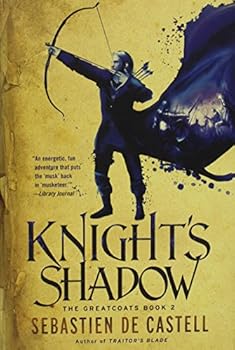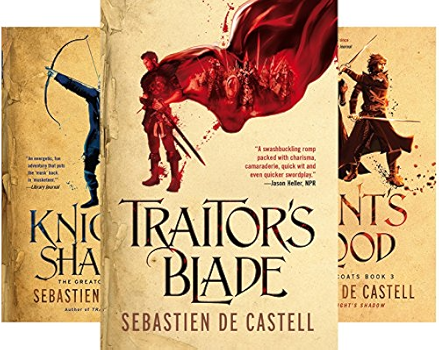
![]() Knight’s Shadow by Sebastien de Castell
Knight’s Shadow by Sebastien de Castell
I absolutely loved Sebastien de Castell‘s Traitor’s Blade, first in his GREATCOATS series, having been immediately charmed by the utterly winning voice of its first-person narrator Falcio val Mond and its flamboyant Three Musketeers-like tone and narrative. So I was greatly looking forward to its sequel, Knight’s Shadow. I’m pleased to say that while I had a few issues, for the most part I was wholly satisfied despite such high expectations.
The sequel picks up pretty much right after the close of Traitor’s Blade and continues with the same basic goal: find a way to keep the king’s thirteen-year-old heir Aline alive long enough to place her on the throne despite the continued violent opposition of the dukes and of Trin, the main protagonist from book one. As in that opening volume, Falcio journeys with his two fellow Greatcoats and best friends Kest and Brasti. Other characters return as well, such as the Tailor, the king’s manipulative and devious mother who has sworn to do all it takes to put her granddaughter on the throne; Valiana, Falcio’s sort-of Greatcoat protege; Ugh, Falcio’s former torturer and liberator; and a few others. The major new character is Dariana, one of the Tailor’s new Greatcoats (Falcio describes them as “Excellent fighters with no conscience whatsoever”).
I’m not going to say anything else about plot or characters because one of the great pleasures of Knight’s Shadow is its many unexpected turns, which serve to keep the reader always on his/her toes. I wrote “nice twist” several times in the margin, and I can’t think of the last time a book surprised me so often, even if I did figure out the major question relatively early (it was… Yeah, like I’m going to tell you). Despite being a definite strength, the many shifts do come with a cost. There is so much story here, and so many turns, that at times some of the scenes feel a little too truncated, cut off before they had time to fully flower. In one case, for instance, Falcio and friends are asked to solve a murder, and it felt like de Castell had some potential for a rather good police procedural/detective type narrative there, but soon we’re on to something else. The two obvious solutions for this are either to cut out a few threads or lengthen the book, and to be honest, I’m not sure which I would have preferred. The fact, though, that I would be fine with an even longer book (almost never something I wish for in this genre) tells you something about how good Knight’s Shadow is.
Cutting a few scenes would work as well, or at least be doable, because the novel is episodic in structure, with a lot of traveling from place to place, interacting with new characters, and new problems. What keeps the novel unified are a few overarching goals: garnering support for Aline to take the throne, keeping everyone alive, and trying to figure out who is trying to kill them and also destroy the country (that last one may be a multiple choice question). What could have been a baggy, meandering tale, often an issue with episodic narratives, is lent a sharp sense of focus and urgency (this is a minor spoiler — one revealed very early) by the detail that Falcio is day by day losing his battle with the poison he was given at the end of book one, each morning taking longer and longer to come out of paralysis. This ticking clock tool was a smart plot device by de Castell even if it edges a big close to contrivance in its execution now and then.
Beyond plot, as with Traitor’s Blade, character, voice, and tone remain strong elements of this series. Falcio’s wryly self-deprecating yet idealistic voice is just as inviting and the banter among the friends is often just a joy. Here, for example, is their discussion upon coming across a situation on the road:
“Any signs of a trap,” I asked.
“Nothing I can see,” Brasti said…
Kest looked behind us along the road. “No sounds of anyone coming from behind.”
“No sign of danger at all,” Brasti said.
I loosened both my rapiers. “So definitely a trap then.”
“Oh, absolutely,” Brasti said, and motioned for me to go forward. “I imagine you’ll want to walk right into it.”
“I’ll come with you,” Valiana said.
Many such moments pepper the novel, but while its humor is a definite plus, as it was with Traitor’s Blade, Knight’s Shadow is I’d say a much more emotionally weighty novel than its predecessor, with several quite moving scenes, several horrific ones, and an overall grimmer tone. The moving scenes are well earned and deftly handled (displaying as well de Castel’s ability to fully invest even side characters with life). And the overall tone works well in the context of the plot and of the character development. I wouldn’t necessarily say our main characters are more mature, but new events, as well as the cumulative impact of prior ones, affect them all deeply, changing them and forcing them to find ways to integrate these changes into their lives, as well as causing them to reevaluate prior beliefs. This lends each of them a richer hue and is one way Knight’s Shadow improves on the first book.
That leaves those horrific scenes. One in particular gave me pause — what happened to Falcio’s wife. We learned of this in Traitor’s Blade, but here we see it in vivid, visceral, stomach-turning detail. I’m always a bit torn on these types of scenes. On the one hand, I question the need for them at all and the level of detail. On the other hand, part of me thinks if you’re going to have such a scene, then it should be stomach-turning rather than being whitewashed via bland language or overly terse reference. I’m still mulling this one over. My other issue is its use to motivate Falcio, though de Castell does go elsewhere with it and may redeem its use somewhat. I don’t know. I think I’ll be wrestling with this one for a while, to be honest.
Knight’s Shadow didn’t quite sweep me along as much as Traitor’s Blade did. But I’m not sure, given its different tone, that it could have. In some ways it’s not quite as strong as the first book — less tight for instance. But in other ways, the richness of its emotions and the way its characters deepen and change (I particularly liked that de Castell let each go on his own for a bit, even if we didn’t get multiple POVs), it’s an improvement on its predecessor. All of which adds up to it being a different book, always a plus for a sequel. Knight’s Shadow entertains in its own fashion, leading me to this somewhat paradoxical reaction: I may have enjoyed it less but liked it more. For those that find that a bit too zen, four and a half stars.
~Bill Capossere

Sebastien de Castell
![]() Knight’s Shadow, the second book in Sebastien de Castell’s GREATCOATS series, keeps the convolutions twirling, as Bill notes above. The plot gets more complicated and loyalties are called into question, as Falcio, First Cantor of the Greatcoats, tries to protect the king’s heir, Aline, and get her seated on the throne, battling the evil would-be usurper Trin, rebellious peasants, and of course the Greatcoats’ hereditary enemy, the Ducal Knights, in the process.
Knight’s Shadow, the second book in Sebastien de Castell’s GREATCOATS series, keeps the convolutions twirling, as Bill notes above. The plot gets more complicated and loyalties are called into question, as Falcio, First Cantor of the Greatcoats, tries to protect the king’s heir, Aline, and get her seated on the throne, battling the evil would-be usurper Trin, rebellious peasants, and of course the Greatcoats’ hereditary enemy, the Ducal Knights, in the process.
I definitely agree with Bill that in one specific case, the plot twists left a point behind and it disappointed me; Falcio promises to solve a murder. Ultimately by the end of the book he does, but as that particular story unfolds, he, Kest and Brasti take off on another adventure before they even get started.
On the plus side, which is where most of my comments lie, the characterizations deepen, particularly with Valiana, but also, in an odd way, with an adversary, Duke Jillard. It’s hard for Falcio (or the reader) to see anything good about Jillard, but his love for his son redeems him in this story.
The twists and turns never stop; the action is fast and furious too. There is plenty of suffering, and, to balance that out, plenty of banter and humor. Falcio’s dead wife, who was a problem for me in Book One, (and, honestly, is still a problem for me) is handled better here, as de Castell goes in a different direction with Falcio’s emotional connection to her.
Like Bill, I figured out one plot twist fairly early, but there were several others I did not see coming. A couple of moments had me almost tearing up — seriously — and one of those was with Ugh, a character we first met while he was torturing Falcio in Traitor’s Blade.
Falcio’s struggle, not only to do the right thing, but to figure out what the right thing is, is engrossing, and I found myself thinking, “I’ll just read a few more pages…” way too late into the night way too many times. De Castell facilitates this by writing very short chapters.
There was no sophomore slump here, and the end positions us perfectly for Saint’s Blood, the third book.
~Marion Deeds




That’s interesting. While I enjoyed Traitor’s Blade, I came away from it a little dissatisfied, feeling it had some issues in terms of pacing and focus. Knight’s Shadow, on the other hand, absolutely blew me away and delivered on everything I wanted to see in the first.
I’ve heard good things about Traitor’s Blade, so I’m glad to hear that the second book is also good (occasionally in different ways). Someday I’ll get around to reading this series!